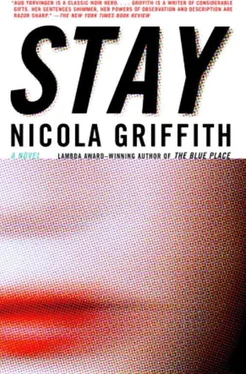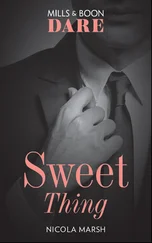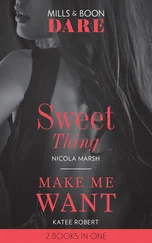“Just a bit of hammering?”
“We’d have to fire up the generator and hang a few lights, but, yes, just a bit of hammering.”
We split the night open with noise and light and the stink of diesel and it felt good, it felt human, and although the tarps were heavy and the nails awkward, although Dornan hit the knuckle of my left index finger once and his own thumb twice, I think we both had the most fun either of us had enjoyed for months. It was a single, simple, discrete task, and we did it well.
When the generator had been turned off and the tools stowed in the hogpen, we went into the trailer. In the steady, yellow-white fluorescent light, Dornan’s shoulders were no longer hunched; the lines at the corner of his eyes were not as deep. I felt tired, and peaceful.
“Time for bed,” I said. “Tomorrow I want an early start.”
I did not sleep for a while. From the woods to the west, a screech owl hooted. Another answered from the north. Calling to each other in the dark.
I shook Dornan awake just before six. “I have a long drive today. I want to be out of here in an hour. Clean the shower after you’ve finished.”
While he blundered about getting showered and dressed, I poured coffee, then unplugged and cleaned his espresso machine. I unloaded the fridge and put the perishables in a cardboard box.
Dornan peered into the box over his coffee. “Eggs. Green peppers. Seems like an odd choice to eat on the road.”
“This is for you to take with you. No point it all going to waste.”
“You expect to be gone a while, then?”
“A few days. I’ll call, when I find her. That’s all you need to know. Now drink your coffee and load your car. I want to leave before seven.”
I wiped down the inside of the fridge and propped the door open, shut down the appliances one by one, turned off the propane and water lines, checked locks, latches, and bolts on the cabin, hogpen, and trailer, put my bag and phone in the truck. The light in the clearing was like cool green tea, and dozens of birds sang. Dornan leaned against his Isuzu, sipping coffee and looking forlorn.
“Got everything?”
He nodded.
“Then I’ll call you in a few days.”
He nodded again, turned and slid into his seat, put his coffee in the cup holder and the key in the ignition, but didn’t shut the door. “Which way are you heading?”
“Go home, Dornan. Go home and take care of your business. Don’t come back here. I’ll call you.”
I stood there for a long time after he bumped his way over the turf and down the track, until the smell of his exhaust had faded into the trees and soil, and I could hear nothing but the birds. The air smelled like rain.
By seven-thirty I was on I-26 heading north and west for Tennessee. If I ignored the weather, ignored the scenery, and just drove, I could hold the clearing in my mind; I could imagine the soft patter of rain on the leaves—a flatter sound, now that the leaves were drier and getting ready to fall—building to a harsh rattling, the gush of rain runneling over the rich forest loam. In my truck, I could pretend I was not heading for a place hard with machine hum and concrete and seething with people who stank of fear and need. Once on I-81 I crossed Tennessee and Virginia at a steady seventy-five miles an hour, tires thrumming rhythmically over the concrete and whining on the asphalt, stopping only to refill the truck’s huge twin tanks. At about one in the afternoon, just before Roanoke, I took a twenty-minute break to eat, drink, and use the bathroom. I didn’t stop again until seven in the evening, not far outside Harrisburg. Both times I chose seedy, ill-lit fast food shacks where the colors would be dim and the noise low—no children screaming and running up and down, no canned music—and I wouldn’t have to smile or talk. In the rest room I didn’t look in the mirror. When I got back into the truck near Harrisburg, the wind was blowing pewter clouds into an already darkening sky.
“It won’t work,” Julia said.
“What won’t?”
“Pretending. The world’s out there. You have to move through it at some point.”
I changed gears unnecessarily and didn’t reply.
“And why do you need a truck in New York?”
She gave me that smug smile she always used when she was being Socratic, and disappeared.
Rain hissed against my windscreen, washing it to silver and mercury. I hadn’t thought further than the fact that I didn’t want to fly. The truck was familiar, a piece of my refuge. I should have rented a car in Asheville.
I drove grimly through the rain. Pennsylvania became New Jersey. I took the Newark Airport exit, and the streaming windscreen yellowed to cadmium and sodium as I approached the long-term parking lot, which turned out to be full of cars but empty of people. The rain was steady, and when I looked up as I got out of the truck, falling drops seemed to stretch and streak until they were golden needles. It seemed I had not thought to bring a coat.
The shuttle bus was driven by a woman with drooping eyelids and swollen knuckles. One of the pair of doors wouldn’t open fully; I had to hold my bag in front of me to squeeze through. The driver watched noncommittally. “Which airline?” Jamaican accent.
“American.” It made no difference. The bus jerked into motion.
Inside it was too hot and too bright, the air swollen with rain evaporating from wet passengers, bulky with coats and hats and umbrellas. I couldn’t breathe. I shut my eyes. Grass, trees, pigs rooting by the remains of a fallen tulip tree. Fish finning idly in the dark, deep water near the bank. The bus jerked again, and I heard “Which airline?” delivered in exactly the same tone, as though the driver were a machine, except the designers of such a thing would have made it pretty and white and young, with an insanely cheerful smile and large breasts.
The bus stopped again. “United,” the voice announced, and I stood up with a couple who studiously ignored each other, even though their matching rings said they were married. The driver didn’t seem to care that I was getting out at the wrong stop.
The terminal was a madhouse of flashing blue-and-white screens, security personnel in red-piped uniforms waving people through lines, green exit signs, arrows pointing this way and that at eye height and overhead, labels on bathroom doors, logos on storefronts, and flashing Bureau de Change icons, and it roared with voices and trundling luggage wheels, childish screams and the beeps of video games and cellular phones. I walked into the nearest rest room, into a stall, and shut the door. Grass, trees, pigs rooting by the remains of a fallen tulip tree. Grass, trees, pigs. Breathe. The place stank of disinfectant and dirty water. My heart rate slowed.
I changed from my wet traveling clothes into an Eileen Fisher tunic and trousers, swapped my boots for shoes, added earrings, and left the stall. The sinks were slimed with violently green liquid soap, scummy with old lather, and dripping with dirty water. I reached for the paper towel dispenser and stopped. The mirror showed a face with wild eyes and skinned-back lips, the face of a fox gone mad. I closed my eyes and rubbed my cheeks and forehead with the heels of my hands, stretched the muscles wide then pulled them tight, pulled and relaxed, until they let go. I practiced until my expression was bland, then went to find a cab.
I said, “Midtown, the Hilton. Fifty-third and Sixth.”
The cab was hot and reeked of air freshener. My window wouldn’t work. Halfway through the Holland Tunnel my knuckles began to ache; I wanted to punch the glass from the doors and escape.
The city sucked the cab north with terrifying ease, as though we were falling downhill, as if the whole island had tilted north. I closed my eyes against the momentary vertigo. When I opened them again, I kept my gaze focused forwards. Even at ten-thirty, traffic blared, lights flashed, and pedestrians gesticulated as they walked swiftly. Radio City Music Hall was already advertising the annual Christmas Rockettes show; there must have been some special event at MoMA because women in elegant dresses and men in casually expensive clothes streamed onto the wet sidewalk, whose slick black surface sizzled with reflected electric blue and neon pink. A sea of people, all distinct, all with dreams and fears, bank accounts and health problems, family and enemies. Too many, far too many.
Читать дальше












